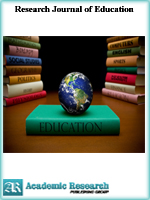Research Journal of Education
Online ISSN: 2413-0540
Print ISSN: 2413-8886
Print ISSN: 2413-8886
Quarterly Published (4 Issues Per Year)

Archives
Volume 2 Number 6 June 2016
Confucius: Teacher Supreme
Authors: Kuang-ming Wu
Pages: 110-115
Abstract
Confucius’ education revolutionizes our world future humanistic by provocation in joy, amidst failures continual. So, this essay has six sections: one, being “one” in structuring the bewildering details historical and much more, two, being reverent to history, classics, parents, and fellow beings, three, Confucius “seduces” us to good, four, his provocation of students, five, his looking forward that relies on students, and six, finally, his joy in the very midst of continual failures in his ideal of joys together in world concord as one family.
Statistical Analysis of the Effects of Kolawole?s Problem Solving (KPS) and Conventional Teaching Methods on the Academic Performance and Retention of Senior Secondary School Students in Mathematics in Ekiti State, Nigeria
Authors: Prof. E. B. Kolawole ; Mrs. Oluwatoyin Ojo
Pages: 100-109
Abstract
The study investigated statistical analysis of the main, Joint and individual effects of Kolawole’s Problem Solving (KPS) and conventional teaching methods (CM) on the academic performance and retention of senior secondary school students in Mathematics in Ekiti State, Nigeria. The study also sought to find out whether teaching Mathematics with KPS method is gender and location biased. The study adopted quasi-experimental pretest and post-test research design. The population of the study consisted of all senior secondary schools students in Ekiti State Nigeria. A sample of 400 students were randomly selected from 8 local Government Areas of Ekiti State. Intact classes in each school were randomly selected from each of the 8 Local Government Areas putting into consideration gender and locations of the schools. The results of study showed that all this sample students were homogeneous at the commencement of the study. There were main, joint and individual significant teaching effects of the Kolawole’s Problem Solving (KPS) and conventional methods on academic performance, and retention of senior secondary school students in Mathematics. Also, there was no significant difference in the academic performance and retention of students in rural and Urban Areas and also between male and female students. Based on the findings it could be concluded that KPS is an effective method while conventional method improves and contributed positively towards the academic performance and retention of the students but ineffective method of teaching Mathematics’ KPS method is more effective and students retained more knowledge than convectional method (CM). Finally, KPS method of instruction is neither location nor gender biased. Based on the above findings, KPS method should be adopted as an effective method of teaching Mathematics) in Senior Secondary Schools in order to improve teaching, learning, solving and evaluation skills of the Mathematics teachers as well as those of Mathematics students. Furthermore, seminars and workshops should be organized on KPS for the teachers for effective teaching,-learning,-solving, and evaluation of Mathematics.



